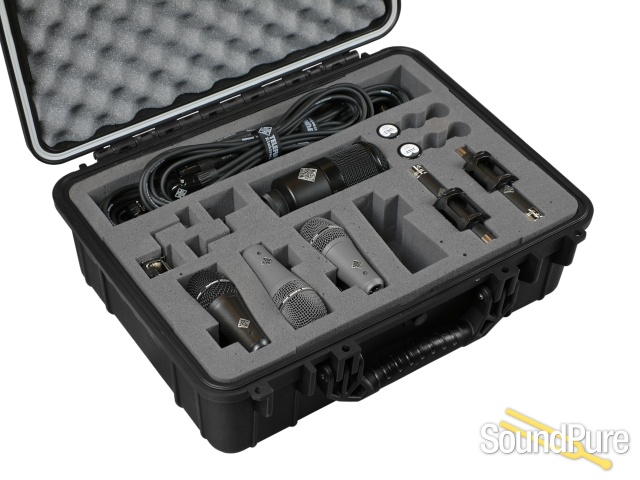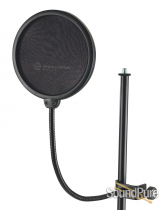TELEFUNKEN Elektroakustik has assembled the three unique voices of its TEC Award winning Dynamic Series microphone line, in combination with two matched small diaphragm FET condensers, and packaged them as the 6-microphone DC6 Drum Pack for drum recording and live performance applications. Each microphone set consists of the M82 handling kick drum duties, the M80-SH on snare, the M81-SH for toms, and the M60 FET Cardioid for cymbals or overheads. The DC6 ships in the heavy-duty hard shell HC87 flight case and include multiple drum mounts (M 782, M 784 and M 785) and an SGMC-5R five meter XLR cable with a right angle female connector for each microphone in the set.
DD6 Drum Microphone Set includes:
1x M82 with M 782 mount
1x M80-SH with M 784 (metal) and M 785 (plastic) mount
2x M81-SH with M 784 (metal) and M 785 (plastic) mount
2x M60 FET with M 761 elastic mount
6x SGMC-5R five meter XLR with right angle female connector
1x HC87 Hard Shell Flight Case
M80-SHB
TELEFUNKEN Elektroakustik created the M80-SHB for use on snare drum and vocal applications where a lower profile microphone with right angle XLR cable is needed. The M80-SHB is the same exact circuit as the M80 Standard, housed in a shorter microphone body with a built-on stand mount. The wide frequency response and higher SPL capabilities of the M80-SHB offer the user a superior alternative to the midrange-laden character of many of the industry's standard dynamic microphones. A tight cardioid polar pattern and a frequency response boasting a subtle rise in the high end result in a microphone that is equally suitable for snare drum, vocals or instruments on both the stage and the studio. The M80-SHB is finished on both the headgrille and body with a durable, textured black powder coat.
M81-SH
The M81-SH was designed with the goal of developing a mic that would not only complement the M80-SH, but also stand out in a universe filled with dynamic microphone options. Building off many of the strengths of the M80, the TELEFUNKEN M81-SH retains the same minimal proximity effect, superior feedback rejection, and an articulate mid-range. However, with the M81-SH, the top end is pulled back a bit, yielding a flatter overall frequency response. This combination results in a microphone with a wealth of body and clarity, making it a great tool for fattening up toms, percussion and horns, or taming brighter vocals or thinner sounding sources. The M81-SH is identical to the M81 in circuit, but housed in a shorter microphone body with a built-on stand mount, and finished in a durable, textured dark gray powder coat on both the headgrille and body.
M82 Dynamic
The TELEFUNKEN Elektroakustik M82 is a robust large diaphragm end-address dynamic microphone that has been designed for kick drum and vocal broadcast applications. Hand-assembled in CT, USA, the M82 features two independently functioning EQ switches: KICK EQ and HIGH BOOST, which in turn offer four unique voices. The M82's KICK EQ switch engages a passive filter that reduces some of the lower mid-range frequencies (centered around 350Hz) commonly cut when processing a kick drum. The HIGH BOOST switch tilts the upper mid-range and high frequencies (starting around 2kHz with a 6dB boost by 10kHz) to allow for extra articulation. In the flat setting (both switches off), the M82 is equally suited for vocals, guitar amps, and brass.
M60 FET Cardioid
The newly designed TELEFUNKEN Elektroakustik M60 FET (Field Effect Transistor) small diaphragm microphone is TELEFUNKEN Elektroakustik's first non-vacuum tube, FET-based solid-state condenser microphone. The DC6 includes two identical M60 FET amplifiers and two matched TK60 cardioid capsules. The TK60 features a 6-micron gold-sputtered membrane measuring 15mm in diameter, with a surprisingly full low end, and a quick and accurate transient response. The frequency response is flat from 150 Hz to 7 kHz, with a smooth, airy presence peak at 8 kHz making it ideal for drum overheads, hi-hat and ride cymbals, as well as various mallet and string based percussion. The M60 FET's incredibly quick transient response captures nuances and subtleties with impressive precision and clarity. This results in an extremely detailed sonic image with definition and presence, perfectly suited for the complex character of string instruments and percussive sources.


















